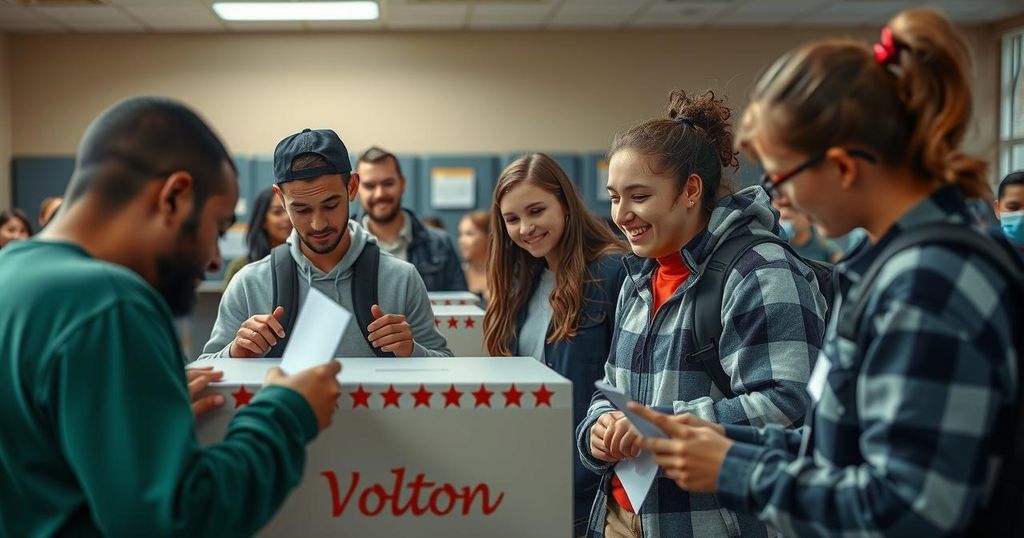As early voting progresses in North Carolina, CMS high school students are also voting for the 2025 student advisor to the Board of Education. This position enables students to engage with board meetings and represents student concerns, with voting open to grades nine through twelve from October 21 to November 5. Interest in the role surged this year, with 148 applications from across the district. Current senior Ailen De Bonis holds the position, with several finalists showcasing diverse initiatives aimed at amplifying student voices.
As early voting continues across North Carolina, Charlotte-Mecklenburg Schools (CMS) high school students are taking part in the electoral process by voting for the 2025 student advisor to the Charlotte-Mecklenburg Board of Education. This initiative allows students to engage with the board and voice their concerns, an opportunity that is significant given that all CMS students in grades nine through twelve are eligible to participate in the voting process from October 21 through November 5, which coincides with the general election. It is noteworthy that only students who are eighteen years old and meet other criteria can cast their vote in state and local elections. The student advisor position, established in 2016, is pivotal in fostering a connection between the Board of Education and the student voice. While the student advisor is not a voting member, they attend board meetings and provide valuable perspectives that contribute to the decision-making process. The student advisor furthermore serves as an officer within the Charlotte-Mecklenburg Youth Council and collaborates with the CMS partner Generation Nation. The current student advisor is Ailen De Bonis, a senior at Ardrey Kell High School. Applications for this position saw a substantial increase of 59% this year, rising from 93 in 2023 to 148 in 2024, marking a first in which applicants came from every comprehensive high school in the district. Dee Rankin, the vice-chair of the Board of Education and a member of the selection committee, remarked on the significance of the candidate pool, calling it a “real opportunity to help inform Board decisions through their student perspective.” This year’s finalists are: – Gabriel Guerra Barceló, Charlotte Engineering Early College: Originally from Venezuela, Barceló aims to advocate for underrepresented communities, intending to enhance communication between the board and students while improving access to resources. – Quinten Canty, West Charlotte High School: As chief of staff for the Student Government Association, he desires to empower marginalized students and ensure they feel heard. – Tatiana Collins, Independence High School: Collins wishes to serve as an effective liaison between the board and students, focusing on increasing student awareness of available resources. – Alejandra Flores, Olympic High School: Flores aims to create a supportive environment for all students and to advocate for a more flexible absence policy. – Sydney Glover, Garinger High School: Glover aspires to facilitate dialogue between the board and students to address inequalities. – Katelyn Morton, Northwest School for the Arts: Morton focuses on promoting equitable access to educational resources and enhancing arts education in under-resourced schools. – Ngozi Nwauwa, East Mecklenburg High School: Nwauwa is dedicated to ensuring all students have the necessary resources for academic success, especially those with learning differences. – Lucy Silverstein, Providence High School: Silverstein emphasizes inclusivity and the necessity of mental health resources for students. – Madden Wilkinson, Hopewell High School: Wilkinson wants to amplify student voices and engage them more effectively with board proceedings and communications. This election is a noteworthy case of student engagement in governance, highlighting the importance of including youth perspectives in educational decision-making processes.
In recent years, the role of student advisors in educational governance has gained prominence as schools seek to include student voices in decision-making processes. In Charlotte-Mecklenburg Schools, the establishment of a student advisor position provides a platform for high school students to share their insights and perspectives with local education leaders. This initiative is part of a broader push to promote civic engagement among young people and ensure that the decisions made by educational boards reflect the needs and concerns of the student body.
The involvement of Charlotte-Mecklenburg Schools high school students in voting for the position of student advisor exemplifies a commitment to incorporating student voices in educational governance. Through this initiative, students are empowered to address issues affecting their peers and influence board decisions. The current pool of finalists indicates a diverse representation of interests and aspirations, each candidate poised to advocate for their fellow students and enhance communication between the student body and the Board of Education.
Original Source: www.charlotteobserver.com







